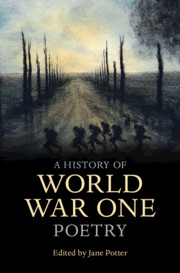Book contents
- A History of World War One Poetry
- A History of World War One Poetry
- Copyright page
- Dedication
- Contents
- Illustrations
- Contributors
- Acknowledgements
- Introduction
- Part I Literary Contexts
- Part II Nations and Voices
- Part III Poets
- Chapter 20 Non-Combatants
- Chapter 21 Edward Thomas (1878–1917)
- Chapter 22 Guillaume Apollinaire (1880–1918)
- Chapter 23 Siegfried Sassoon (1886–1967) and Edmund Blunden (1896–1974)
- Chapter 24 Anna Akhmatova (1889–1966)
- Chapter 25 Mary Borden (1886–1968)
- Chapter 26 Georg Trakl (1887–1914)
- Chapter 27 Isaac Rosenberg (1890–1918)
- Chapter 28 Ivor Gurney (1890–1937)
- Chapter 29 Wilfred Owen (1893–1918)
- Chapter 30 David Jones (1895–1974)
- Part IV
- Bibliography
- Index
Chapter 25 - Mary Borden (1886–1968)
from Part III - Poets
Published online by Cambridge University Press: 18 January 2023
- A History of World War One Poetry
- A History of World War One Poetry
- Copyright page
- Dedication
- Contents
- Illustrations
- Contributors
- Acknowledgements
- Introduction
- Part I Literary Contexts
- Part II Nations and Voices
- Part III Poets
- Chapter 20 Non-Combatants
- Chapter 21 Edward Thomas (1878–1917)
- Chapter 22 Guillaume Apollinaire (1880–1918)
- Chapter 23 Siegfried Sassoon (1886–1967) and Edmund Blunden (1896–1974)
- Chapter 24 Anna Akhmatova (1889–1966)
- Chapter 25 Mary Borden (1886–1968)
- Chapter 26 Georg Trakl (1887–1914)
- Chapter 27 Isaac Rosenberg (1890–1918)
- Chapter 28 Ivor Gurney (1890–1937)
- Chapter 29 Wilfred Owen (1893–1918)
- Chapter 30 David Jones (1895–1974)
- Part IV
- Bibliography
- Index
Summary
This chapter explores the First World War poetry of Mary Borden, placing it against the backdrop of her critically acclaimed prose record, The Forbidden Zone (1929). Borden published her poetic responses to her war experience as a post script to this text. Like the other fragments and short stories, these poems draw on her experience with the Hopital Chirurgical Mobile No. 1, inviting the reader to see, hear, smell, and interpret the war along with the poilus whom she treated. Borden’s poems offer a record like no other, often adopting stylistic tropes of modernism to articulate the unspeakable. The chapter also examines some very different wartime poems that document her love affair with her future husband, Edward Spears. Powerful and erotically charged, these poems encapsulate a very different kind of war experience, enabling Borden to speak with a range of poetic voices.
- Type
- Chapter
- Information
- A History of World War One Poetry , pp. 409 - 423Publisher: Cambridge University PressPrint publication year: 2023

